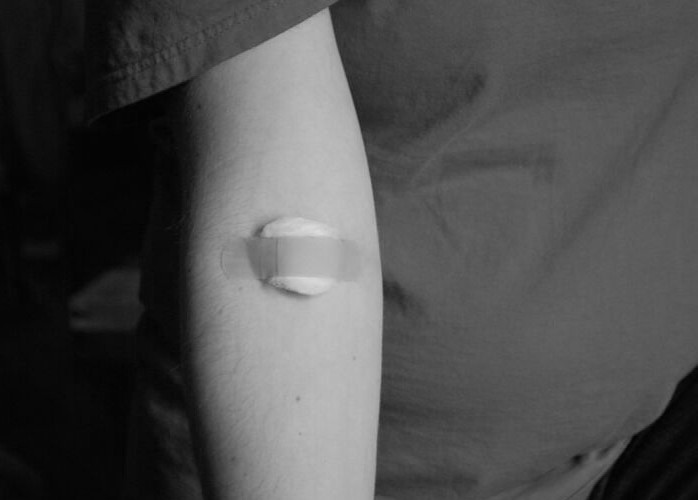It is not very often that someone is asked about their blood type. Many people don’t even know what their blood type is. Although it is not vital information for day-to-day life, a person’s blood type is very important in determining what donated blood they can receive. Many advertisements for blood collection by the Canadian Blood Services has contained a message directed at people of a specific blood type, O-, the universal donor. Through a simple test done by doctors and Canadian Blood Services personnel, your blood type can be determined. But what does your blood type mean? Why is it important? You may think that blood is blood, right? While all blood is composed of the same four basic constituents: plasma, red blood cells, white blood cells, and platelets, not all blood is alike. There are, in fact, eight different blood types. They’re differentiated by the presence or absence of antigens, substances that “trigger an immune response if they are foreign to the body” (American Red Cross, 2015). The four type categories, based on the presence or absence of these antigens on the surface of the red blood cell are:
Group A – has the A antigen on the red blood cells with the B antibody in the plasma.
Group B – has the B antigen on the red blood cells with the A antibody in the plasma.
Group AB – has both A and B antigens on red blood cells, with neither A nor B antibodies in the plasma.
Group O – has neither A nor B antigens on red cells with both A and B antibodies in the plasma.
There is a third antigen, called the Rh factor, which also plays a role in determining your blood type. If the Rh antigen exists in your blood, your blood type is positive (i.e. B+), whereas if the Rh antigen was absent, you would be type negative (i.e. AB-). Some blood types are more common than others. Type O+ is the most common, accounting for around 38% of the American population, while type AB- accounts for only 1% of the American population (livescience.com, 2012). Blood type O is the universal donor blood type, meaning that type O blood can be administered to anyone, regardless of blood type. Someone with an AB blood typeis a universal plasma donor, because the plasma does not contain either A or B antibodies. Blood type is hereditary, just like eye colour, and is therefore determined by the blood types of your parents. If you are unsure of your parents’ blood types, or of your own, a simple test can be conducted by your family doctor or by the Canadian Blood Services to identify your specific blood type, and evaluate the current need for your type. If you are unsure of whether you are eligible to donate blood, Canadian Blood Services conducts a simple questionnaire either online or in person. Saving you the trouble of going to the clinic and finding out you are not eligible, the eligibility requirements will be outlined here. For further information, consult the Canadian Blood Services website, or go to the on campus clinic October 7th or 8th for a consultation. In general, if you are in good health, feeling well and able to perform your normal activities, you are older than 23, or are between 17 and 23 and meet the height and weight requirements, you can become a blood donor. A calculator can be found on the Canadian Blood Services website to determine whether or not you meet the height and weight requirements. However, you may still be ineligible for donation if ‘your own health or the safety of the blood supply would be at risk by having you do so,’ (Canadian Blood Services, 2015). Some common reasons why people are deemed in eligible for donation include recent body piercings, Chronic Fatigue Syndrome, possible exposure to HIV/AIDS, tattoos, and vaccinations.If you have gotten a body piercing or a tattoo done within the last 6 months, you are ineligible to donate blood because of the increased risk of Hepatitis C. Acupuncture and electrolysis fall under the piercing category. Donors with a medical history of Chronic Fatigue Syndrome (CFS) are ineligible – even if their condition is not active. If you have recently been vaccinated, depending on which vaccination you received, you may be temporarily deferred from giving blood. There is a full list of deferral periods for various vaccinations on the Canadian Blood Services website. If you have ever had a positive HIV test, or if you have done something that puts you at risk for becoming infected with HIV, you may be ineligible as well (Canadian Blood Services, 2015). For example, anyone who has taken money or drugs for sex since 1977 cannot give blood; nor can anyone who has ever used intravenous street drugs. In the past, gay men were restricted from donating blood, but for the first time in thirty years changes to the regulations have made it easier for gay men to donate blood. “Men who have had sex with another man more than 5 years ago, and who meet other screening criteria, now may be eligible to give blood,” (Canadian Blood Services, 2015). Numerous groups are rallying for the removal of this ban, deemed archaic and homophobic, but the Canadian Blood Services organization is still reeling from the aftershocks of a tainted blood scandal. As many as 800 people died, 20 000 are now living with Hepatitis C, 400 with HIV. Despite more accurate tests, a false negative to an HIV screening would still have devastating consequences, and so a group ban on sexually active gay men still stands.

